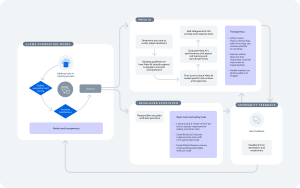BRUSSELS — The European Parliament has made significant strides in regulating Artificial Intelligence (AI) by endorsing new transparency and risk-management rules for AI systems, emphasizing a human-centric approach. The proposed regulations, approved with an overwhelming majority, aim to ensure transparency, safety, and ethical development of AI systems. MEPs have expanded the list of prohibited AI practices, including bans on intrusive and discriminatory uses, such as real-time remote biometric identification and predictive policing systems. The rules also introduce obligations for providers of foundation models and transparency requirements for generative models like GPT. Additionally, the regulations support innovation through exemptions for research activities and citizens’ rights to file complaints and receive explanations about AI systems. The EU AI Office will monitor implementation, underscoring Europe’s commitment to responsible AI technology, according to a press release published on EuropaWire .
Key Points:
- Risk-Based Approach: MEPs adopt a risk-based approach, imposing obligations on AI systems based on the level of risk posed, with strict prohibitions on AI systems that pose an unacceptable risk to safety, including subliminal techniques and manipulative practices.
- High-Risk AI and Transparency Measures: High-risk areas now include potential harm to health, safety, fundamental rights, the environment, voter influence, and recommender systems on social media platforms. Transparency measures for generative models like GPT include disclosing AI-generated content and publishing summaries of copyrighted data used for training.
- Support for Innovation and Citizens’ Rights: Exemptions are provided for research activities and AI components distributed under open-source licenses, and regulatory sandboxes will be established for controlled testing of AI. MEPs emphasize citizens’ rights to file complaints about AI systems and receive explanations for decisions made by high-risk AI systems.
Quotes:
After the vote, co-rapporteur Brando Benifei (S&D, Italy) said: “We are on the verge of putting in place landmark legislation that must resist the challenge of time. It is crucial to build citizens’ trust in the development of AI, to set the European way for dealing with the extraordinary changes that are already happening, as well as to steer the political debate on AI at the global level.”
Co-rapporteur Dragos Tudorache (Renew, Romania) said: “Given the profound transformative impact AI will have on our societies and economies, the AI Act is very likely the most important piece of legislation in this mandate. It’s the first piece of legislation of this kind worldwide, which means that the EU can lead the way in making AI human-centric, trustworthy and safe.”
Next Steps:
Before negotiations with the Council on the final form of the law can begin, this draft negotiating mandate needs to be endorsed by the whole Parliament, with the vote expected during the 12-15 June session.



















